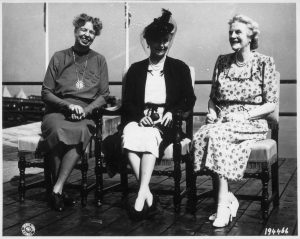1943-1945
Winter 1943 (Age 68)

Winston Churchill, Parliament Square, London © Sue Lowry & Magellan PR
March 20, 2015
The Casablanca Conference
As he prepared to leave for Casablanca Churchill also considered his plans for postwar Britain. Full employment, improved education, increased housing, better health care with no increase in cost of living were to be his priorities.
On 12 January he left for Casablanca where the leaders of Britain and the United States planned the invasion of the European continent. Churchill thought that it was essential for them to alleviate the pressure on the Soviets in 1943 with an attack on Sicily and then a cross-Channel invasion. The allies also had to reassure each other of mutual support. The British feared that the Americans might give priority to the Pacific front and the Americans were concerned that Britain would pull out of the war after the defeat of Germany. French unity was also important and General de Gaulle was invited to meet with and hopefully accept the authority of General Giraud in North Africa.
The Conference had been kept secret until the press conference on 24 January. The press, wrote Churchill, could hardly believe their eyes and then their ears when they heard that the Conference had been meeting for two weeks. Roosevelt and Churchill had agreed to continue convoys to Russia, send support to American forces in China, begin plans for a June landing in Sicily, and build up American forces in Britain. They also announced (against Churchill’s inner judgment) that Unconditional Surrender was the only term which the Allies would accept to end the war. This decision would bring the criticism that it unduly prolonged hostilities.
The leaders drove to Marrakech, where Churchill showed Roosevelt the Atlas Mountains and enjoyed his only opportunity to paint during the war. Then Churchill flew on to Cairo, where he was advised by his former research assistant, William Deakin, to support Tito in Yugoslavia. He continued up the coast where he met the President of Turkey, He returned to Cairo via Cyprus where he again met with the Fourth Hussars, of which he was Colonel in Chief. Back at Cairo he learned of the surrender of the Germans at Stalingrad.
He also gave attention to India, once more pressuring Wavell to press the attack on Burma. Wavell responded that India, two-thirds the size of Europe, was still threatened from within, as well as by Japanese and German forces from East and West. Gandhi had been arrested and was about to begin his first hunger strike.
At his final dinner in Cairo Winston and his son, Randolph, “snapped at each other,” but the party relaxed when the Prime Minister regaled everyone with stories of his adventures at Omdurman. The voyage home included a visit to Montgomery at Tripoli and Eisenhower at Algiers. WSC arrived in London on 9 February and immediately met with the Cabinet to review the war situation. That evening he watched the movie “Casablanca.”
The journey of 10,000 miles had exhausted him and within days he had a cold and sore throat. Lord Moran diagnosed inflammation of the base of the lung. Rest was ordered, even his regular meetings with the King were cancelled, but the patient was allowed to read a novel. He chose “Moll Flanders.” While recovering he felt great anxiety for the situation in India. Gandhi’s fast caused all the Indian members of the Viceroy’s Executive Council to resign and Churchill was worried about the impact of the fast on public opinion in Britain and the United States, as well as India.
As he recovered in early March he was able to go to Chartwell, where he was visited by the King. The Germans in North Africa were fighting desperately but the8th Army was inflicting a severe defeat upon them. On the Eastern Front the spring thaw brought the war to a muddy halt.
Stalin still distrusted his allies. He demanded a second front and accused them of treachery. This was an indication of the postwar problems that would have to be faced concerning Russia. Churchill told the Editor of The Times that he favoured confederations with smaller states after the war. “I do not want to be left alone in Europe with the Bear.”
Subscribe
WANT MORE?
Get the Churchill Bulletin delivered to your inbox once a month.




